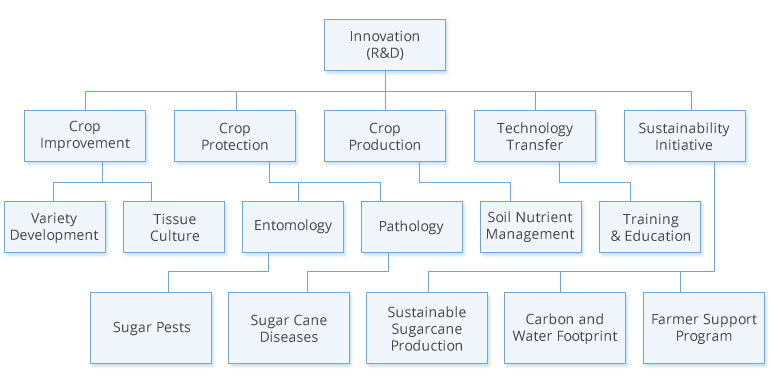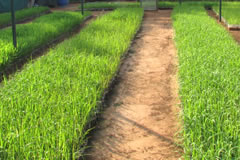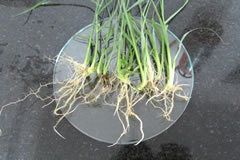E.I.D. – Parry is the first Sugar Company in India to set up a dedicated R&D facility, recognised by the Department of Scientific and Industrial Research (DSIR) and amongst the very few sugar companies in the world, to have an active cane breeding programme.
EID Parry’s farmer-centric programmes have set the standards in sustainable farming practices in the sugar industry. The Company has been in the forefront in disseminating scientific farming methodologies at various levels, sharing its expertise on soil types, crop varieties and cultivation practices, to increase both yield and productivity.
Varietal development programme – Sugarcane breeding
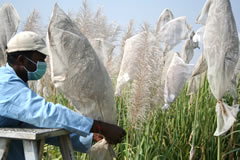
EID Parry’s sugarcane breeding programme focuses on the development of proprietary varieties of cane with superior traits of yield and productivity that ensure higher economic returns for the farmers and higher recovery for the mills. Every year around 600 crosses are made to develop varieties which are high yield and high recovery, including multi-purpose varieties for ethanol, high fiber, etc. The selected propriety clones are tested both in-house and through AICRP (All India Coordinated Research Project) to withstand various soil conditions and for disease and pest resistance.
EID Parry is a member of AICRP and also a testing centre for conducting the Mandatory-Co-ordinated Agronomic Experiments Evaluation (CAE) of sugarcane varieties developed by Tamil Nadu Universities.
Tissue Culture and seed cane management
Pure, clean and healthy seed cane determines the performance of the crop by ensuring maximum germination and plays an important role in obtaining higher cane yield and sustaining varietal vigour. Purity of seed in terms of variety, without mixtures, has a major impact on the recovery.
The protocols for mass multiplication and clean seed cane production of identified sugarcane varieties to be supplied to the farmers, is standardized at EID Parry’s state- of-the- art tissue culture laboratories.
The Company has developed a unique 3 tier nursery programme using the tissue culture technology. This is integrated with Sustainable Sugarcane Initiative (SSI) production which involves using less seed material, less water and optimum utilization of fertilizers and land to achieve more yields.
Entomology
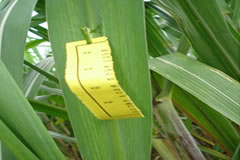
E.I.D. Parry was amongst the first in India, to establish bio control agents as an integral part of pest management and as an alternate to chemical pesticides. The Company’s vision of environmental sustainability was perceived two decades ago when it established the bio control lab. This has made a major impact in reducing or avoiding the use of chemical pesticides. The Company’s pest control programmes adopts a two pronged release approach to control pests:
- Trichogramma, an egg parasitoid which attacks Inter Node Borer (INB) at the egg stage.
- Tetrastichus, a pupal parasitoid.
E.I.D Parry is the first sugar manufacturer to introduce bio-control breeding centres using the farmer-entrepreneur model. The trichogramma production centres managed by farmers have contributed to both rural prosperity and commitment from the farming community to sustainable practices.
Pathology
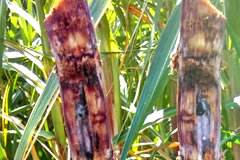
Sugarcane crop is affected by fungi, bacteria, viruses and phytoplasma diseases, of which fungi are largely responsible for reducing yield of sugarcane worldwide. The diseases damage the crop from the very first stage of growth and development till harvesting. The fungi and bacteria cause direct yield loss whereas the viral and phytoplasma diseases indirectly affect cane yield and quality in sugarcane by reducing the crop vigour. The impact of diseases is more in the ratoon. Many promising varieties were removed from cultivation in the past since they succumbed to new pathogenic variants with more virulence.
E.I.D Parry’s integrated management of sugarcane diseases involves care in seed material such as seed selection, sanitation, seed treatment, crop rotation, drainage and irrigation schedules. Varietal resistance is the most easy, economical and precautionary control measures against all such diseases.
Soil
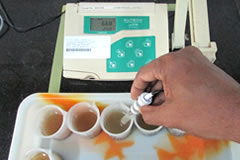
Sugarcane crop requires readily available nutrients for the full exploitation of its cropping potential, which in turn is reciprocated in terms of high yields. This reveals that high yields of sugar cane can only be attained on soils which can satisfy the high nutrient demand and optimum water availability for sugar cane. This necessitates the assessment of the nutrient supply capacity of the soils, which in turn depends on the physical and chemical properties of the soil.
E.I.D Parry has a modern soil testing lab with the facility to analyze macro, secondary and micro nutrients. Balanced fertilizer recommendations are made based on soil testing reports .
Farmer Training and Education
Training is imparted to farmers on a regular basis on Improved Land Preparation, Soil Health Management, Water Management, Seed Cane & Nursery Management, Integrated Plant Protection – Weeds, Pest and Diseases, Importance of Soil testing and Nutrient Management, Ratoon Management and Sustainable Sugarcane Cultivation.
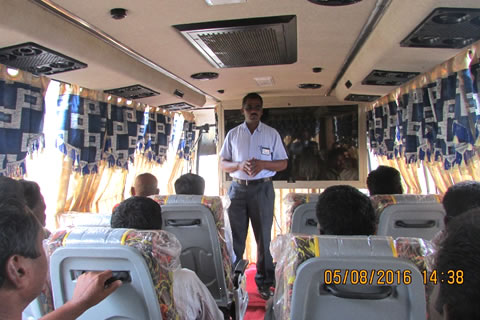
BONSUCRO Certification
EID Parry is committed to sustainability, addressing key requirements of small landholders for sustainable sugarcane cultivation. The Company is a member of Bonsucro since November 2008 (Better Sugarcane Initiative) that fosters the sustainability of the sugarcane sector through a metric-based international certification and by supporting continuous improvement for members.
E.I.D-Parry holds the distinction of being the first sugar manufacturer in Asia and the first in the World, dealing with small holding farmers to be BONSCURO certified (3 units at Pugalur, Nellikuppam and Haliyal units are Bonsucro certified).
The Company integrates sustainable sugarcane agronomy practices with small landholder agriculture and provides training for farmer capacity building, for becoming Bonsucro certifiable.
Collaborative projects on Water and Carbon Footprint
EID Parry is part of a collaborative project with leading international organizations, to measure water and carbon footprint in sugarcane production and to develop a Decision Support Tool for cane farmers and other stakeholders for Sustainable Water Management. Efficient methods of water usage are taught to farmers to reduce depletion of water tables.
To mitigate the pollution from Greenhouse gas emissions and reduce the carbon footprint in sugarcane production, E.I.D Parry has trained its farmers on corrective action with efficient crop management practices. Enhanced carbon sequestration, efficient use of inputs and better crop residue management is part of the Company’s multi-pronged approach to reduce carbon footprint.
